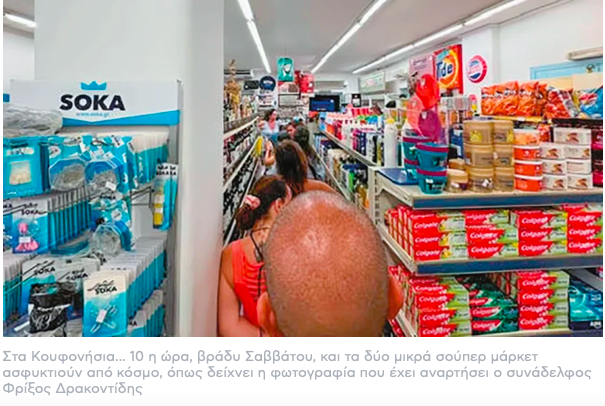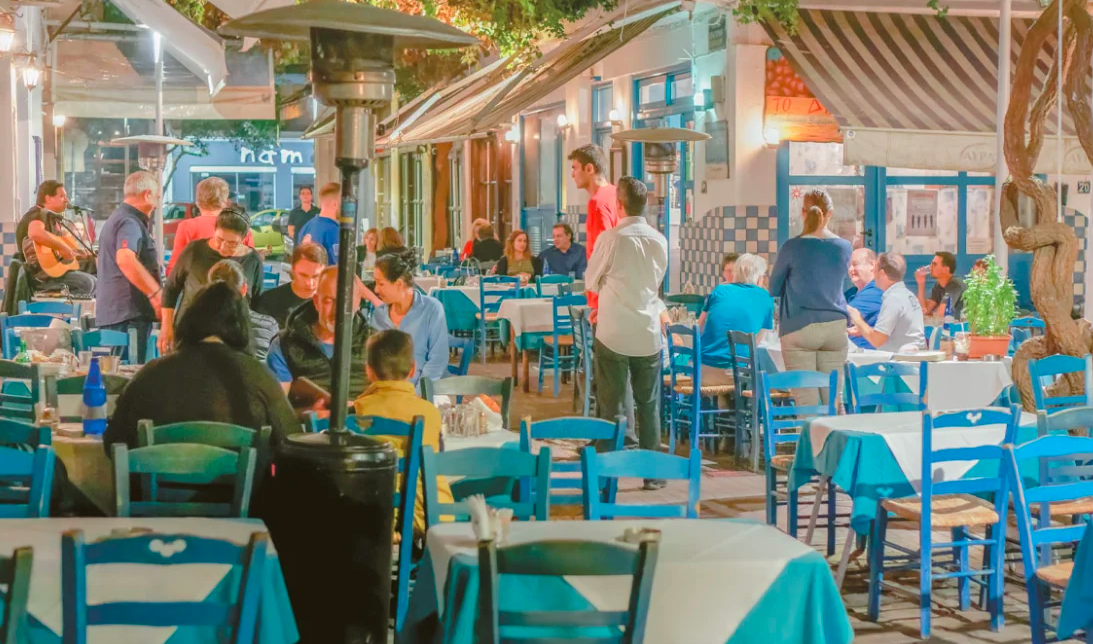On August 15th, at 10:50 AM, outside a well-known multinational supermarket chain in Leptokarya, Pieria, the queue looks enormous. All tourists waiting for the store to open at 11 AM to buy mainly ready meals, vegetables, and drinks before heading to the beach, so everything is ready when they return to their rooms. Dining at a tavern, even in the evening, is not an option. At most, they’ll grab a souvlaki or a slice of pizza to eat while strolling through the village.
A few days earlier, on Sunday, a similar scene unfolded several hundred kilometers away in Kallithea, Halkidiki. There was a line outside the supermarket, while taverns and restaurants were empty despite peak tourist traffic! The same picture is seen on the islands, perhaps more pronounced, as tourists, both Greek and foreign, adjust to a more expensive reality. In Koufonisia at 10 PM on a Saturday, the two small supermarkets are crowded, as shown by a photo shared by colleague Frixos Drakontidis.
Bars and taverns are struggling to attract customers, even in August. However, retail professionals are rubbing their hands in satisfaction as tourists turn to pasta, canned goods, and ready meals to cut costs on already high expenses. According to recent data from ELSTAT, airline ticket prices have increased by 18.4% compared to last year, accommodation prices by 12.6%, organized holiday packages by 7.5%, and dining by 6.6%.
New Habits
Inflation and the cost of living, which have been reducing the real incomes of Greeks and Europeans for the past two and a half years, are starting to create new habits in tourist spending. The country is on track to achieve a new record for tourist arrivals this year, with passenger traffic at Athens International Airport up by 14.5% and regional airports up by 6.4%. However, tourists’ spending is no longer flowing throughout the entire tourism chain, which has also become expensive. In simple terms, budgets have tightened, with dining being the first victim, seeing a drop in revenue compared to last year in almost all destinations, ranging from a small 20% to as much as 40%, according to industry insiders.
On the other hand, businesses in organized retail, from supermarkets and mini-markets to kiosks, are benefiting from this trend. Evidence of this is the fact that in the past two years, islands and tourist destinations have become focal points for the expansion of major supermarket chains, as they generate high revenues and profits. Every year, the tourism boost to organized retail turnover in the country exceeds 1 billion euros and is growing.
On August 8th, AB Vassilopoulos opened its latest store in Paroikia, Paros. This was preceded by the one in Hersonissos, Crete, in a clear effort by the second-largest player in the retail market to capitalize on high demand.
“The trend is clear. Tourists are turning to retail for vacation solutions,” says AB Vassilopoulos CEO Nikos Lavidis, which is evident in expensive destinations. “For example, in Mykonos, while visitor numbers might have decreased and dining revenue is down, our franchisee’s sales are up by 15%-17% compared to last year,” says Lavidis.
“However, this trend is universal and applies to both island and mainland destinations. In Tinos, our store is showing a 10% increase compared to last year. The same goes for Naxos, where data shows a decrease in island visitor numbers. Double-digit sales increases are also seen in our two franchisees in Paros covering Naousa, Marpissa, and Antiparos. The same is true for Samos and Patmos. But where I am particularly surprised this year, mainly due to the absence of traditional Russian visitors, is Halkidiki, where our two stores are experiencing an annual growth of 15%.”
A similar picture was described in his latest meeting with journalists by Aristotelis Panteliadis, President and CEO of METRO ABEE, which operates Metro Cash & Carry and My Market, and also President of the Union of Supermarkets of Greece. He mentioned that retail performance in the past two years has been slightly better.
“We read about how well tourism is doing, but wholesale hasn’t seen that, unlike previous years. This means that tourists didn’t spend much outside. Instead, they spent more on-site, for example, in apartments rented via Airbnb, which might explain better performance in retail,” Panteliadis said. METRO ABEE is also considering expanding to islands such as Lesbos, Kos, Samos, and Kefalonia, with the Cyclades as a second phase.
Island Expansion
Expanding the network of stores, whether owned or through franchising, is a priority for AB Vassilopoulos, as explained by Lavidis: “Generally, we make very careful moves in our expansion. However, you cannot ignore tourist revenues, especially as they are additional income for us. Therefore, we have now opened the store in Paros and previously opened one in Rhodes and another in Hersonissos, Crete. These are classic tourist areas. In Hersonissos, where the large hotels are, customers even come from all-inclusive resorts. They buy ready meals and drinks primarily. They don’t go out to restaurants. They do what they do in the hotel plus what they buy from the supermarket. Then they return to the hotel.”
Seasonal turnover is such that it overcomes any hesitation about the store having little traffic for a six-month period. “It makes the annual turnover within 5-6 months. So that’s not a big problem. The major issue is finding staff. We find few locals and have to bring employees from other stores. For example, in Paros, we found only two locals out of twenty. The rest were sent from other stores, so we had to rent rooms for them until the store was properly staffed. This, however, means a high operating cost. But still, you can’t overlook such a market and the revenues it will bring,” explains Lavidis.
All major supermarket chains are rushing to seize this new opportunity by opening new stores or acquiring local chains in places where, due to intense seasonality, such investments were previously unjustifiable. Among the most active in this area over the past two years has been the Masoutis chain.
With a landmark agreement in 2022 with SYNKA and later acquisitions of Galaxias – Dimitra Markets, Markatos, and Afoi Ioannou Denaxas, Masoutis has established a presence in Crete, Naxos, Paros, Milos, Tinos, Syros, Santorini, Mykonos, Corfu, Kalymnos, Chios, Andros, and Mytilene, with the next target being Lefkada, as mentioned by President and CEO Yiannis Masoutis during the inauguration of the large store in Corfu town.
The increasing importance of tourist destinations to the turnover and development of supermarkets is highlighted by the latest annual survey from NielsenIQ. According to this, supermarket sales on the islands received a significant boost from the presence of Greek and foreign visitors.
Notably, in 2023, according to NielsenIQ data, supermarkets on the islands saw double-digit growth rates (+12.9% in Crete and +14% in the Ionian and Aegean islands) compared to a +9.3% increase in the overall market turnover. Meanwhile, the contribution of the islands to total food retail sales reached 11.2% in the height of summer, up from 8.4% for the entire year.

Losses in Dining
The big loser from the efforts of Greek and foreign tourists to cut their vacation costs is dining. This is because while transportation and accommodation are considered inelastic expenses for someone on vacation, cutting dining costs is easier, with the choice of either eating in accommodations or grabbing quick food like takeaway.
“Consumption has decreased significantly,” says Giannis Papadopoulos, a businessman and President of the Naxos and Small Cyclades Restaurant and Related Professions Association.
“There is a huge increase in takeaway sales, meaning food to go, and at the same time a significant decrease in dine-in, at the restaurant. Where we used to have two or three cycles of customers in our establishments this time of year, this year we haven’t filled the seats even once. So even at the peak of the season, there is no 100% occupancy anywhere. And what I’m saying doesn’t only apply to Naxos but to the entire Southern Aegean. Overall, I would say there is a revenue decrease, varying from 20% to 40% depending on the location.”
Political Exploitation
Apart from Mykonos and Santorini, where, according to Papadopoulos, the revenue decrease in dining businesses exceeds 50%, partly due to unreasonable charges leading to negative publicity, primarily through social media. “This is due to non-local entrepreneurs applying an exploitation policy,” Papadopoulos says.
“However, this does not mean that all professionals are like this or that visitors won’t find reasonable prices. Dining can still offer solutions, from something simple like a souvlaki to gourmet expensive options. That’s why we say that dining is not a deterrent for people going on vacation. Visitors will first ensure their transportation and accommodation and then spend less on other aspects, mainly affecting dining.
At the same time, dining businesses have seen their operating costs increase by 47% over the past two years, from energy and raw materials to wages. Also, the imposition of a 24% VAT on served coffee and drinks pushes people toward takeaway, where VAT remains at 13%, creating unfair competition. This is a trend that is starting to prevail now, takeaway, and as I
Ask me anything
Explore related questions





